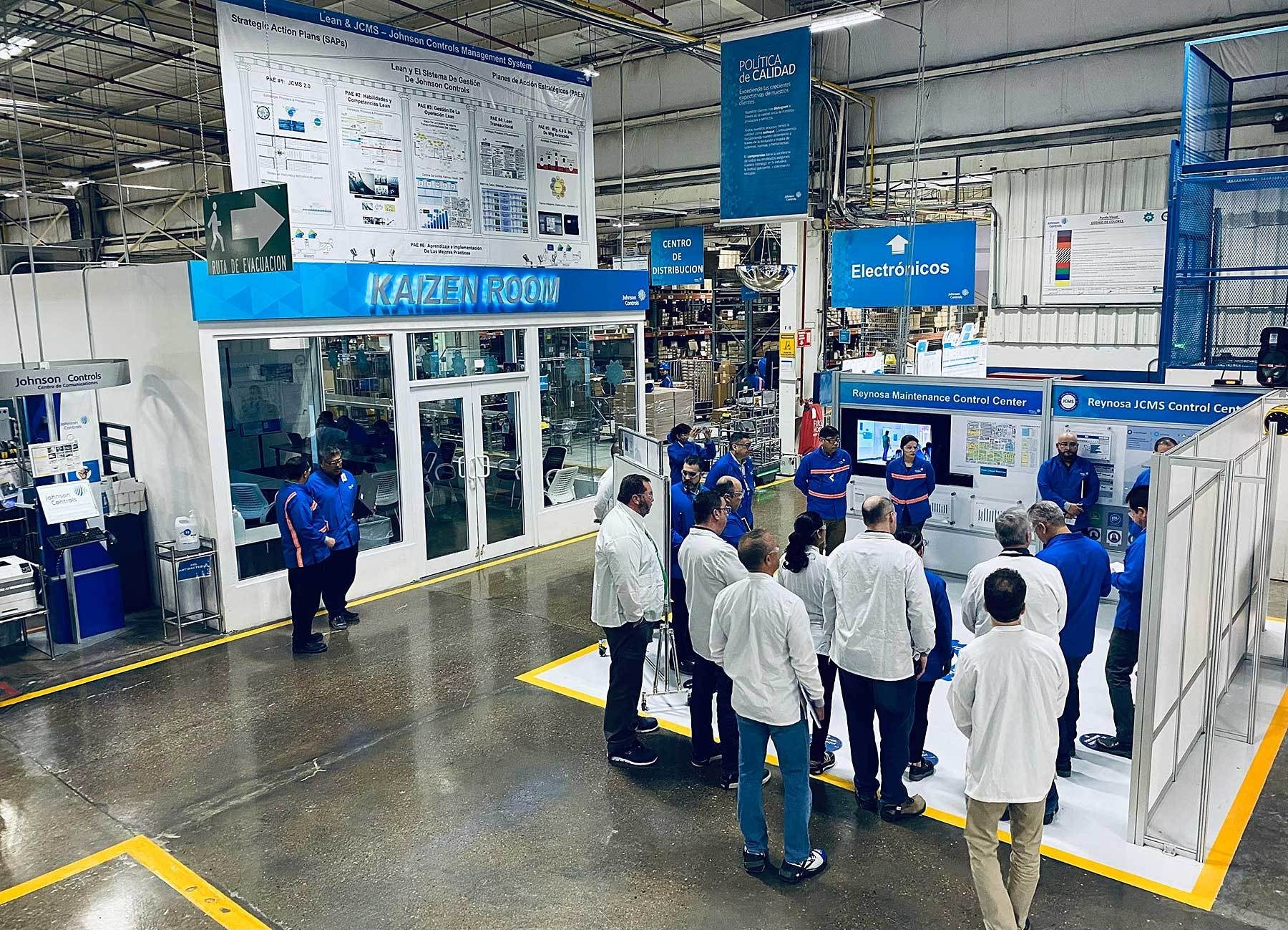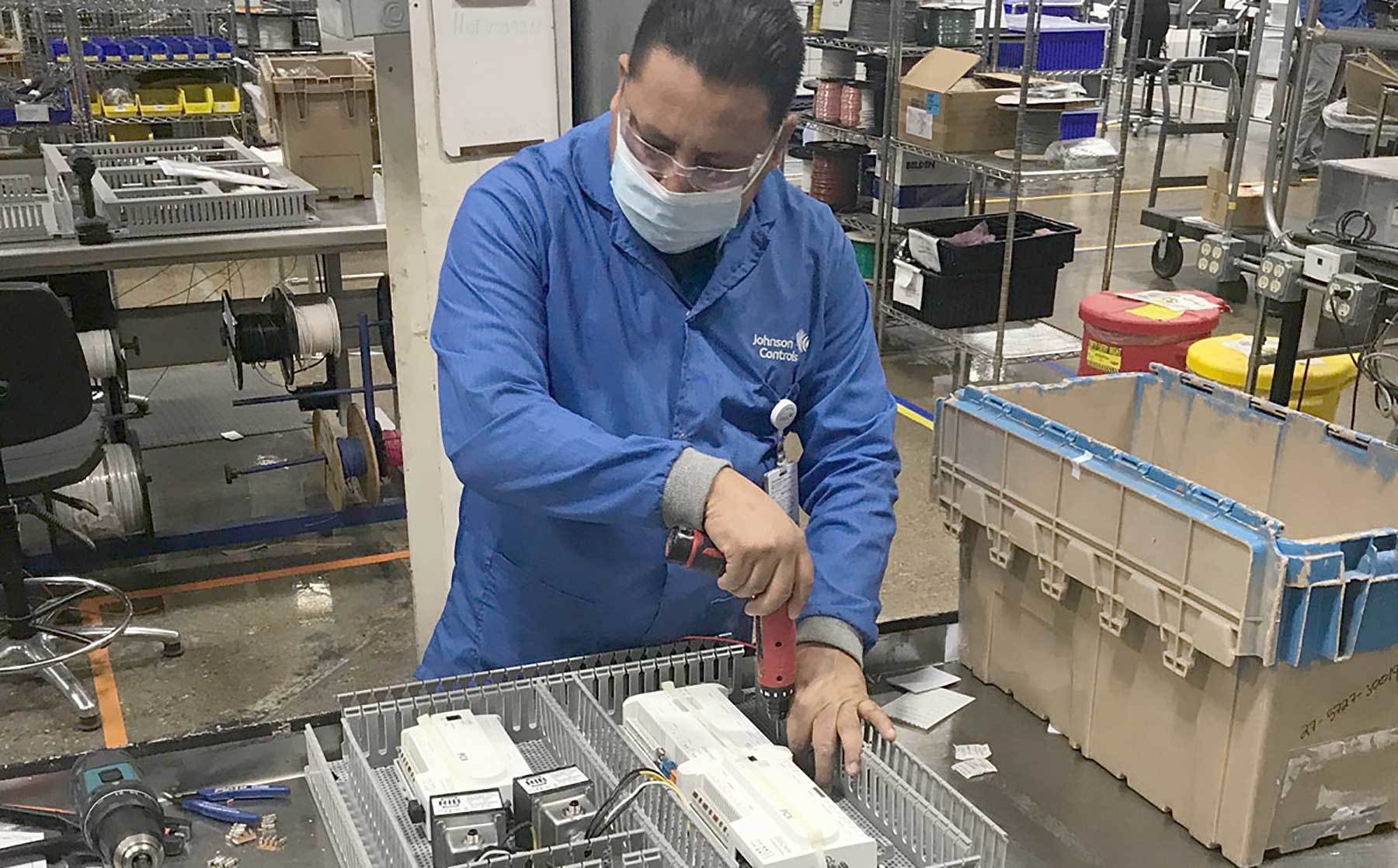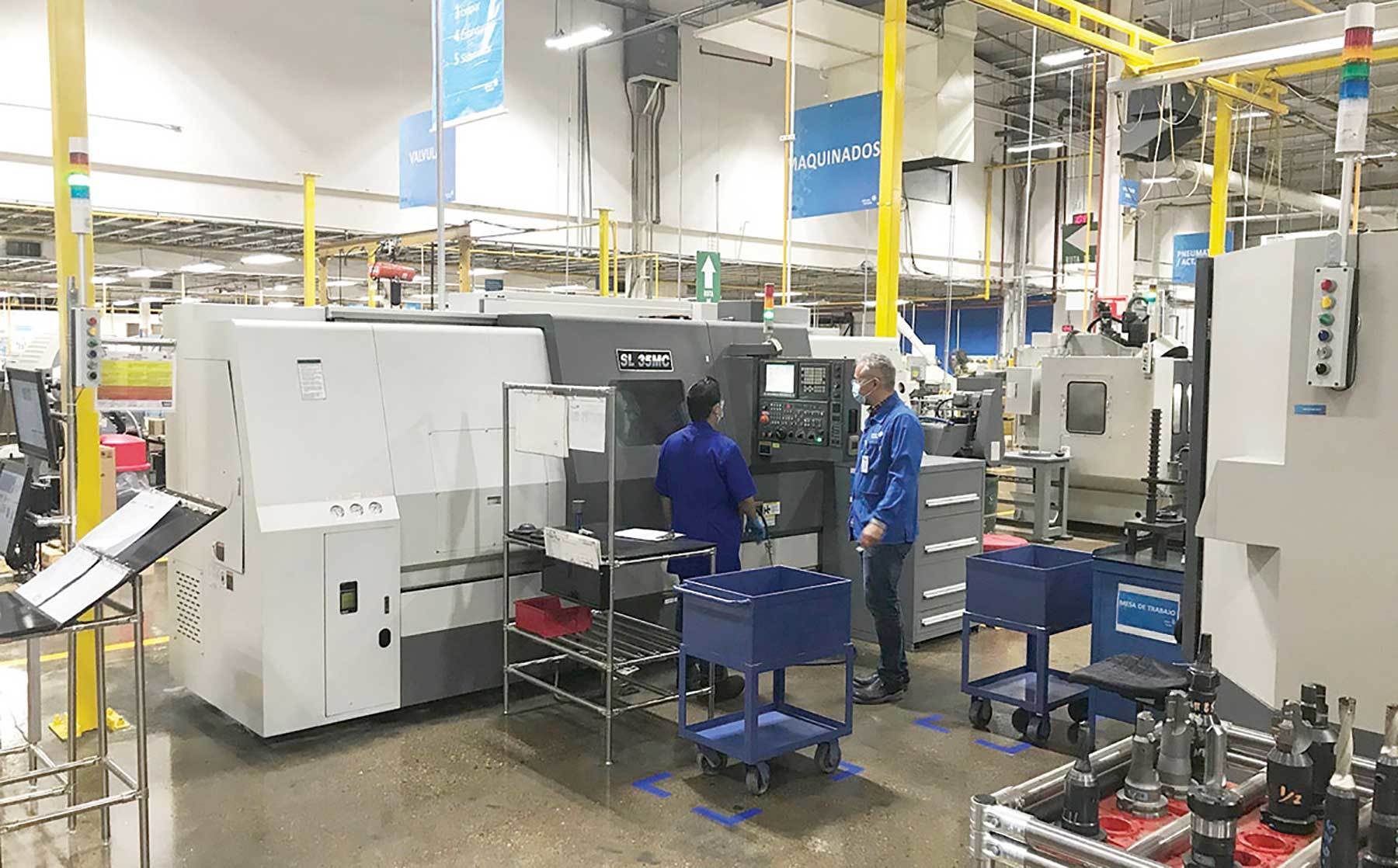JUNE 2023

MANUFACTURING SOFTWARE
Johnson Controls Builds Digital Thread
Software connects 14 manufacturing sites and more than 800 suppliers.
Labor shortages are driving new demand for automation.
Options for Screwfeeding
Labor shortages are driving new demand for automation.
Options for Screwfeeding
The lack of data harmonization led JCI to look for technology that could simplify and standardize data and operational workflows. Photo courtesy Johnson Controls International PLC
Johnson Controls Builds Digital Thread
Software connects 14 manufacturing sites and more than 800 suppliers.
Jodi Holzband// Contributing Writer
Johnson Controls International PLC (JCI) is a world leader in creating safe, healthy and sustainable spaces with the world’s largest portfolio of building technology, software and services. The company’s products are used in healthcare facilities, schools, data centers, airports, stadiums, manufacturing plants and other buildings.
Departments across JCI use various different enterprise resource planning (ERP) systems, so there is no unified “single view” of information. This caused data to become siloed and challenging to find. JCI needed technology that could provide a comprehensive view of information across sites, systems and suppliers, and that could be leveraged to improve operational execution.
Mandeep Sahota, JCI’s vice president of operations, explains the problem with an analogy: “If I’m a baker and I need to bake five cakes a week for the next five weeks, do I have enough ingredients to make them or not? It seems like a simple fundamental question to ask, but as you begin to make different cakes at different quantities and times, it becomes more complex and challenging to manage.”
JCI needed to strengthen its “digital thread,” a term defined by Deloitte as “a single seamless strand of data and computing power that stretches from the initial design concept to the finished part, constituting the information that enables the design, modeling, production, use and monitoring of an individual manufactured part.” The digital thread is essentially a supply chain network that allows companies to leverage information for faster production cycles, higher-quality products and innovation efforts.
With manufacturing sites and systems spread across the globe, trying to make sense of out-of-date static spreadsheets became an increasingly daunting task. The lack of data harmonization led JCI to look for technology that could simplify and standardize data and operational workflows. The company needed readily available, actionable insights to continuously improve operations, a system that could take millions of rows of data and put them together in a platform that would make decision-making faster and more straightforward.
“We were ready for a digital transformation of our supply chain operations, and while our inventory data also needed work, we knew that waiting for the output to be perfect was just one more way to delay this process. What we did was to start with what we had and continue to troubleshoot along the way,” says Sahota.
To improve its manufacturing and supply chain operations data, Johnson Controls implemented LeanDNA, a cloud-based platform that connects the company’s numerous ERP systems. Like many companies with distributed locations and processes, Johnson Controls data was scattered and difficult to find and understand. LeanDNA provides the company with a comprehensive, organized view of cross-site analytics.
Since JCI has global sites, someone could look at a purchase order cost previously and say “why do I have $2 million in purchase orders open?” Now, LeanDNA makes it simpler and quicker to realize that it’s in that site’s local currency. Normalization of this information across different countries and systems was key.
Improving and ensuring data quality is critical for advanced analytics. LeanDNA quickly identifies these opportunities.
When JCI’s IT team notices that the master data is off, it is no longer a guessing game. LeanDNA makes it easy to find the source of the problem and make faster, more accurate decisions continuously. JCI can now have active discussions around what is going on, pinpoint any issues, and show how to fix them to proactively absorb, adapt, and avoid supply chain headaches.
“The raw data is processed by LeanDNA and turned into useful information our teams can actually use and take actions on, giving our team the competitive edge necessary to meet and exceed our customers’ expectations,” says Sahota.
Prior to LeanDNA, some sites were spending several hours a day in meetings to discuss reports and part status. LeanDNA automatically updates reports daily, allowing teams to reallocate the time spent on reporting to higher-valued tasks. Having readily available analytics at their fingertips has allowed JCI managers to act faster and with more confidence. LeanDNA’s technical depth aligns business strategy and workflows with the tools that enable those processes to operate effectively. By leveraging LeanDNA’s recommended actions, JCI is now able to bridge the execution gap for optimal results.

To improve its manufacturing and supply chain operations data, Johnson Controls implemented LeanDNA, a cloud-based platform that connects the company’s numerous ERP systems. Photo courtesy Johnson Controls International PLC
Rightsizing And Optimizing Inventory
Johnson Controls now has the confidence its teams have the parts they need without ordering too much and ending up with excess and obsolete inventory that constrains capacity and working capital. JCI reduced its days of inventory by 12 percent for the applied business unit using LeanDNA in the first year.
Inventory optimization has become crucial for JCI—understanding the plan for every part (PFEP) and where it can optimize ordering policies and parameters for purchased and finished goods to help drive insightful actions.
“Instead of buyers needing to fall back on their institutional knowledge—for example, ‘I think we usually buy six and have four on the shelf, and three parts on a boat’—they can make decisions based on real-time, actual data,” says Sahota.
The approaches that worked in the past are now too reactive, which has led them to shift towards predictive analytics that will eventually become prescriptive through machine learning and augmented intelligence.
To explain the difference between predictive analytics and prescriptive insights, Sahota returns to the cake analogy. “Predictive analytics is this: ‘We have 10 cakes due, but do not have the batter for it now and it might not show up until next week.’ Prescriptive insights is this: ‘If I plan around the seasonal pattern for the ingredients or a holiday where the vendor is closed, then I can avoid these delays in the future,’” he says.
The goal is for everything that is coming through JCI’s factory to eventually leave as a complete customer order. Johnson Controls is establishing velocity by pulling the needle through that digital thread to improve flow and create a collaborative ecosystem that helps ensure teams are ordering the right part and pulling it at the right time.

JCI has been able to connect with hundreds of its suppliers through LeanDNA to streamline status updates so there is no confusion or lag in communication. Photo courtesy Johnson Controls International PLC
Shortage Management And Production Readiness
“It’s difficult to notice or remember these supply chain fluctuations on an individual level, but when you shift your reliance to a trusted platform, you become more aware of these trends and can act on them faster and better. LeanDNA helps us plan and anticipate the supply chain issues to come,” says Sahota.
The LeanDNA platform’s shortage management capabilities give a full-scope view into situational awareness along with the ability to plan accordingly:
- The Clear-to-Build workbench shows factory managers if they have everything they need to begin production in the present.
- Continue-to-Build unlocks a new level of efficiency and improves accuracy in production planning. It recognizes that you might not have all the parts that you need today, but that based on the average cycle time you should continue building because in three days the part will show up and go straight to the production line. LeanDNA shows what the production team can build over the next 13 weeks with consideration of incoming commitments.
- Shortage risk management shines light on what the team needs to focus on for its material fulfillment efforts to reduce risk.
- Supplier collaboration through the platform shows suppliers the purchase orders they should prioritize to stay on track with clear objectives on what to work on next.
“The cross-team collaboration using LeanDNA’s Supplier Connect with suppliers on production orders can help lay out the production schedule,” says Sahota.
By utilizing the full functionality of LeanDNA, manufacturers like JCI have the chance to strengthen their supplier relationships.

Johnson Controls now has the confidence its teams have the parts they need without ordering too much and ending up with excess and obsolete inventory. Photo courtesy Johnson Controls International PLC
Connecting Procurement And Suppliers
“LeanDNA is a key component to our collaborative ecosystem to drive better visibility to our delivery commits and help drive the right business decisions,” Sahota says. “Partnering with our suppliers allows us to give them the visibility they need to understand what parts are critical for production.”
Suppliers are also dealing with inventory shortages and instead of asking them for every part, JCI is creating mutually beneficial relationships with vendors and working together to share information openly.
Sahota’s team is passionate about setting JCI’s suppliers up for success by improving their visibility and communication channels to achieve their goals. LeanDNA has helped improve supplier commitment visibility by 25 to 28 percent.
“We share the key insights our suppliers need to be successful. With LeanDNA we are able to share long-range data and forecasting into our investment, people and growth, as well as information about critical purchase orders impacting production. LeanDNA has become an essential collaboration tool for us,” says Sahota.
JCI took the initiative one step further by hosting a Supplier Connect Symposium in 2022. The purpose of the event was to introduce LeanDNA to its network of suppliers, share best practices, and offer support to partners leveraging the tool.
“During the event, one of our suppliers actually stood up to say, ‘I love LeanDNA,’ which I think just goes to show that we are on the right path,” says Sahota.
JCI has been able to connect with hundreds of its suppliers through LeanDNA to streamline status updates so there is no confusion or lag in communication. Now, Johnson Controls is focused on the stickiness of the Supplier Connect initiative, encouraging its suppliers to make LeanDNA part of their daily routine.
“LeanDNA’s Supplier Connect helps with the flow of information by providing the critical details needed to plan effectively,” says Sahota. “Our partnership and relationships with suppliers are much better as a result.”
Previously, JCI’s suppliers were used to seeing an open purchase order report with thousands of lines. It was easy to miss dates. Now, LeanDNA visualizes the report using a line of balance that shows the weekly quantities that need to be reached.
“If you are trying to get stable material flow, this is definitely a platform you can utilize to connect different parts of your supply chain. It is very easy to stand on the manufacturing floor and see the units being produced, but when it comes to the transactional world of data servers, you do not have that visibility. You don’t have eyes and ears on what is going on in the cloud, whether purchase orders are being placed or delivered on time,” says Sahota.
Through improved transactional transparency, JCI’s supply chain leaders can use LeanDNA to link its supply chain ecosystem. The company can see how well the factory floor is performing with the procurement actions that are critical for production operations. JCI’s inventory levels, data health, and workflow efficiency have all drastically improved with the help of LeanDNA.
“It used to take roughly 5 minutes per SKU to create a line of balance report, but now using LeanDNA, a line of balance report is automatically created with thousands of part SKUs in under a minute,” says Sahota.
Instead of repetitively reporting using manual processes, Johnson Control’s teams leverage automation to streamline work and shift focus onto higher value-added tasks.
For more information on factory analytics and creating a digital thread, visit www.leandna.com.
ASSEMBLY ONLINE
For more information on digital threads and factory analytics, visit www.assemblymag.com to read these articles:




